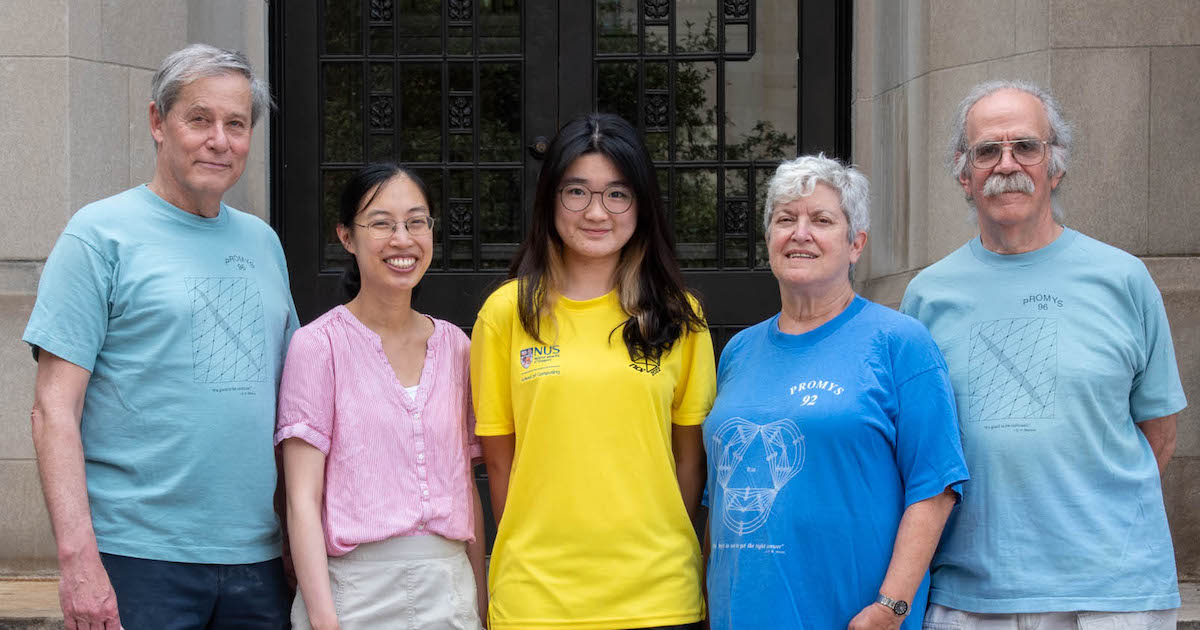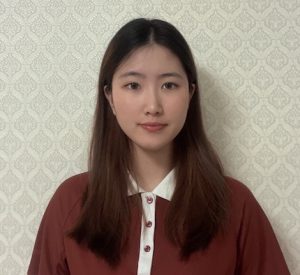Yongren Fellowships to PROMYS
“I have learned what it means to think like a real mathematician.” Zhiyuan Zhou, Yongren Fellow 2018

Envisioned and funded by a generous family foundation, the Yongren Fellowships are full scholarships for mathematically talented high school students in China who could not otherwise afford to participate in PROMYS. The fellowships cover tuition, housing and meal for the six weeks of the program plus visa fees, any required books, and round-trip travel from China.
PROMYS 2024 will run on the campus of Boston University from June 30 - August 10, 2024. Visit pages such as Quick Facts and Mathematics at PROMYS for additional information.
Yongren Fellowship awards are contingent on the accepted Fellows being able to travel to the U.S. and satisfy Boston University Covid-19 vaccination and testing requirements.
"The enthusiasm about maths that all people have at PROMYS does make the program distinctive. It is a rare opportunity to spend six weeks with people that have the same mindsets and interests with you. The friendly and diverse environment also makes it special. People are all coming from different places and backgrounds, it is an opportunity to have a wider understand of the world as well." Jiushan Xie, Yongren Fellow at PROMYS 2022
To Apply for a Yongren Fellowship
- Follow the application instructions on the Application page, including having a parent complete the Financial Aid form.
- Eligible students will be considered for the Yongren Fellowship automatically.

Admissions decisions among eligible applicants are based on the following criteria: an applicant’s solutions to a set of challenging problems, teacher recommendation, high school transcript, and responses regarding interest in the program.
Applicants from China will not be disadvantaged in admissions by applying for a Yongren Fellowship. Since places at PROMYS are so limited, there tend to be only a handful of international students accepted to PROMYS each summer and there are no other spots at PROMYS which are reserved solely for students from China (or any other country). If paying for PROMYS would be burdensome, an applicant from China should apply for a Yongren Fellowship.
Please contact promysus@bu.edu if you have any questions about the Yongren Fellowship.
Eligibility Requirements
To be eligible, an applicant must apply for a Yongren Fellowship and be
- a citizen of China and a resident of China attending high school in China;
- in grade 9, 10, 11 or 12 when applying. (University students are not eligible, though they may be eligible to apply to be a counselor at PROMYS.)
- at least 14 (and no older than 18) by the first day of the program;
- unable to participate in PROMYS without financial assistance; and
- proficient in English: Able to participate fully in mathematical discussions held entirely in English (a TOEFL or IELTS score is not required or accepted nor are SAT scores).
Finalists for the Yongren Fellowship are interviewed by Skype, WhatsApp or telephone.
Yongren Fellowship Notes
- International students at PROMYS need a visitor's visa, not a student visa (F-1).
- PROMYS lectures, discussions, and problem sets are in English; participants should possess English language skills which are strong enough to enable full participation.
- The mathematical material that students tackle at PROMYS is very challenging, and participants are expected to enjoy working intensively in mathematics; but students do not need to have taken any advanced or accelerated mathematics courses to thrive at PROMYS.
- PROMYS is a co-educational program. Students who identify as female and male sleep in separate areas of Boston University campus housing.
- Although the majority of PROMYS students and counselors are from the United States, there are always a number of international students and counselors as well. Over the past 30+ years, there have been students and counselors from at least 48 different countries - including many from China.
- Yongren Fellows will be provided with bed linens and towels during the residential program.
- Laptops are not needed at PROMYS. Students who wish to do so may use Boston University desktop computers at no charge.
- PROMYS students eat their meals in a cafeteria at Boston University. Vegetarian options are always available.
"The PROMYS program is unlike any other program out there. It's really interesting from an academic point of view! You can keep using the known to derive the unknown by learning day after day. You can also solve complex mathematical problems by using simple points from lectures. In other ways the community of PROMYS makes you feel very cared for. You can always schedule a meeting with professors and young counselors to ask even simple questions. Summer school at PROMYS is a lot of fun, not just studying. Everyone is very supportive and really cares about the students." Yiming Ding, 2021 Yongren Fellow from Beijing
“PROMYS is a place where you experience math and understand the elegance hiding behind patterns. The problem sets are arranged in such a good way that students have a chance to discover all the theorems themselves. It's a new way of learning mathematics that is not focused on memorizing facts but on exploration and discovery. I appreciate the opportunity offered by the Yongren Fellowship. It allowed me to pursue further math where my interests lie in." Zehong Zong, 2017 Yongren Fellow from Zhengzhou
"PROMYS is different from most of the mathematical programs in China… I have done a lot of mathematics activities and none of them are similar to PROMYS. First of all, none of them are as long as PROMYS. I had never had a chance to do nothing but math for 6 weeks…The biggest difference is that we get to explore the world of mathematics by ourselves in PROMYS. In other places, the teachers always teach us how things worked before we get a chance to think about them.” Zhiyuan Zhou, 2018 Yongren Fellow from Guangzhou
